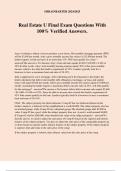©BRAINBARTER 2024/2025
Real Estate U Final Exam Questions With
100% Verified Answers.
Amy is looking to obtain a loan to purchase a new house. Her monthly mortgage payment (PITI)
will be $3,650 per month. Amy's gross monthly income (her salary) is $12,000 per month. The
lender requires a front-end ratio of no more than 32%. Will Amy qualify for a loan? -
answer✔The answer is Yes because Amy's front-end ratio equals $3,650 / $12,000 = 0.304 or
30%.In other words, Amy's total monthly housing expense equals 30% of her gross monthly
income, which is less than the lender's requirement of 32%. Lenders typically look for a
borrower to have a maximum front-end ratio of 28-32%.
John is applying for a new mortgage. After submitting all of his financials to the lender, the
lender calculates that John's total monthly debt obligations (mortgage, car loan, and student
loans) will equal $5,640 per month. John's gross monthly income (his salary) equals $13,000 per
month. Assuming the lender requires a maximum debt-to-income ratio of 42%, will John qualify
for the mortgage? - answer✔The answer is No because John's debt-to-income ratio equals $5,640
/ $13,000 = 0.439 or 43.9%. Since his debt-to-income ratio exceeds the lender's requirement of
42% John cannot qualify for the loan. Lenders typically look for a borrower to have a maximum
back-end-ratio of 36-43%.
CMA: The subject property has three bedrooms. Comp #2 has two bedrooms.Based on the
broker's analysis, a bedroom in this neighborhood is worth $6,000. The subject property also has
an attached garage, while Comp #2 has a detached garage.The attached garage adds $2,000 in
value. Comp #2 has a pool, while the subject property does not. A pool is worth around $4,000.
If Comp #2 sold for $280,000, what should be the value of the subject property? - answer✔To
find the answer, we need to adjust the sales price of Comp #2 based on the superior and inferior
features of the subject property. You have to adjust the sales price of the comparable property up
or down based on superior and/or inferior features of the subject property. If the subject property
is superior, then add value to the sales price of the comp.
If the subject property is inferior, then subtract value from the sales price of the comp.
, ©BRAINBARTER 2024/2025
The subject property is more valuable than Comp #2 by $6,000 for the extra bedroom and $2,000
for the attached garage. However, the subject property is less valuable than Comp #2 by $4,000
for the pool.
Therefore, the value of the subject property equals $280,000 + $6,000 + $2,000 - $4,000 =
$284,000
A buyer makes a written offer to purchase a property and includes a $2,500 earnest money
deposit. The seller makes a counteroffer for more money. The buyer verbally accepts. The listing
agent deposits the money in the trust account at this point in time. When the buyer receives the
seller's counteroffer, he refuses to sign even though he had verbally agreed earlier. The seller is
angry and tells the buyer that he will not return the earnest deposit since the buyer has reneged
on his word. In fact, the seller demands that the listing agent give him the deposit. What must the
real estate agent do regarding the earnest money in this situation? - answer✔He must retain the
deposit in the trust account until he obtains written permission from the buyer and seller or await
a court order.
While a broker was inspecting a property for listing, the property owner told the broker the house
contained 2,400 square feet of heated living area. Relying on this information, the broker listed
the property and represented it to prospective buyers as containing 2,400 square feet. After
purchasing the property, the buyer accurately determined that there were only 1,850 square feet
and sued for damages for the difference in value between 2,400 square feet and 1,850 square
feet. Which of the following is correct? - answer✔Both the broker and the seller are liable.
A provisional broker licensee on active status has just taken continuing education classes for the
first time. These classes were taken before the deadline for completion. He took the BICUP
course and one elective. What will be his license status as of July 1? - answer✔Inactive
A broker licensee may be disciplined by the NC Real Estate Commission for which of the
following actions? - answer✔Drafting a financing contingency addendum at the buyer's request
In North Carolina, unpaid property taxes lawfully constitute a lien against the property as of what
date? - answer✔January 1 of the current tax year
Which of the following is true regarding closing statements in North Carolina? - answer✔The
broker does not have to personally prepare the closing statement.
According to the Statute of Frauds, which of the following leases must be in writing in order to
be enforceable? - answer✔A lease for more than three years
Betsy Buyer is in the market to purchase a new house. She has decided that she will not be
represented by a licensed buyer's agent but wishes instead to be paid the buyer's agent
commission on the house she is buying from Seller Sam. Does this require Betsy to be licensed?
- answer✔No




